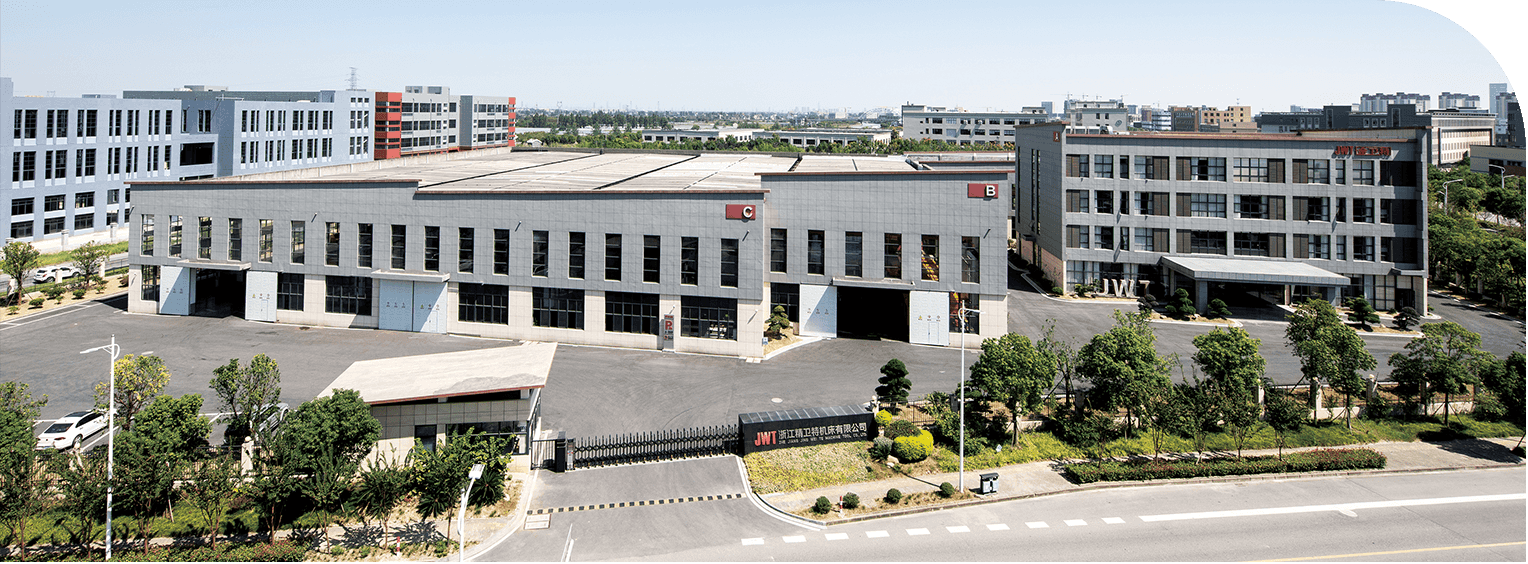
Zhejiang Jingweite Machine Tool is an enterprise integrating industry and trade, focusing on the design and manufacturing of solutions for the metal cutting and processing industry. The core members of the management team have more than decades of experience in the industry and have rich theoretical and practical experience. It has also gathered and internally cultivated a team of professionals with rich experience in basic research, design and application, process manufacturing, industrial automation, inspection and testing in the field of cutting equipment. The R&D center team actively innovates and establishes long-term strategic partnerships with famous domestic universities and advanced technical experts from Japan and Germany. It has obtained 21 invention patents and 72 utility model patents. It has been rated as a national high-tech enterprise. It is the only unit specially invited to participate in the formulation of industry standards and was awarded the Outstanding Contribution Award. The company mainly exports to many countries, and its cooperative customers include many Fortune 500 companies, and has become an important supplier in forging, bearings and other industries. We have been China Automated Production Line Demonstration supplier since 2010. We have our own Automated Production Line Demonstration factory, and a main engine production plant and a parts processing plant. We also have our own international trade department. We produce and sell our products by ourselves. We mainly produce high-speed, super-high-speed metal circular saw machines and support customized automated connections.
-
Revolutionizing Precision and Speed: The Impact of High-Speed Saw MachinesIn the world of industrial manufacturing and woodworking, efficiency and precision are paramount. The high-speed saw machine ...
-
The Role of High-Speed Circular Saw Machines in Modern ManufacturingIn today’s fast-paced manufacturing environment, time is money. High-speed circular saw machines excel at reducing production...
-
Maximizing Efficiency with High-Speed Circular Saw MachinesUnderstanding the Mechanics of Efficiency Efficiency in high-speed circular saw machines is determined by several factors, i...
-
The Power of Heavy Duty Saw Machines in Modern ManufacturingIn the modern manufacturing landscape, the importance of heavy-duty saw machines cannot be overstated. These machines have be...
-
Heavy Duty Saw Machines – Power and Precision in Every CutHeavy-duty saw machines are essential tools in industries where precision and power are paramount. These machines are designe...
What specific tasks or processes can the automated line perform?
An automated production line can perform a wide range of tasks and processes depending on its design and integration. Here are some specific tasks and processes that an Automated Production Line Demonstration commonly handles:
Material Handling and Loading: Automatically feeding raw materials or components into the production process.
Precision Cutting or Machining: Using robotic arms or CNC (Computer Numerical Control) machines to perform accurate cutting, drilling, milling, or grinding operations.
Assembly and Integration: Automatically assembling components or sub-assemblies using robotic arms, automated screwdrivers, or other assembly tools.
Quality Inspection: Implementing automated vision systems or sensors to inspect parts for defects, dimensions, or other quality criteria.
Testing and Validation: Automatically conducting functional tests or performance checks on finished products.
Packaging and Labeling: Automatically packaging finished products into containers, applying labels, and preparing them for shipping.
Material Sorting and Handling: Sorting finished products based on specified criteria, such as size, shape, or quality.
Material Transport: Using conveyor systems or automated guided vehicles (AGVs) to transport materials or products between different stages of the production line.
Data Collection and Analysis: Integrating with MES (Manufacturing Execution Systems) or ERP (Enterprise Resource Planning) systems to collect data on production metrics, downtime, and quality control.
Maintenance and Diagnostics: Performing automated diagnostics or preventive maintenance tasks to ensure continuous operation and reduce downtime.
Energy Management: Optimizing energy consumption through automated controls and scheduling.
What are the benefits of integrating the automated line with ERP systems?
Integrating an automated production line with ERP (Enterprise Resource Planning) systems offers several significant benefits that contribute to operational efficiency, data accuracy, and overall business effectiveness. Here are the key benefits:
Real-Time Data Integration: ERP integration enables real-time synchronization of production data with other business functions such as inventory management, sales, finance, and procurement. This ensures that all departments have access to the most current information regarding production status, inventory levels, and customer orders.
Improved Production Planning and Scheduling: By accessing real-time data from the ERP system, production planners can make informed decisions regarding scheduling, resource allocation, and production prioritization. This helps in optimizing production schedules to meet customer demand while minimizing lead times and production costs.
Enhanced Inventory Management: Integration with ERP systems provides visibility into raw material inventory levels, work-in-progress (WIP), and finished goods inventory. This visibility helps in maintaining optimal inventory levels, reducing excess inventory carrying costs, and avoiding stockouts.
Streamlined Order Fulfillment: Automated Production Line Demonstration integrated with ERP systems can automatically generate production orders or work orders based on customer demand signals from sales orders. This streamlines the order fulfillment process and ensures that production aligns closely with actual customer demand.
Cost Reduction and Efficiency: By automating data exchange and reducing manual data entry errors, ERP integration minimizes administrative overhead and improves overall operational efficiency. This can lead to cost savings in labor, reduced scrap and rework, and optimized resource utilization.
Decision-Making Support: Access to comprehensive, real-time data through ERP integration enables better decision-making at all levels of the organization. Managers can analyze production performance metrics, identify bottlenecks, and implement continuous improvement initiatives based on data-driven insights.
Scalability and Flexibility: ERP systems are designed to scale with the growth of the business and adapt to changing production requirements. Integrated automated production lines can easily accommodate new product introductions, changes in production volumes, or modifications in production processes without extensive IT reconfiguration.



 中文简体
中文简体 русский
русский

















